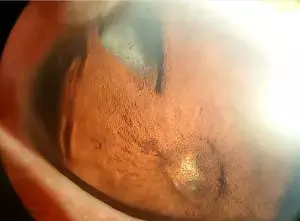- Home
- Medical news & Guidelines
- Anesthesiology
- Cardiology and CTVS
- Critical Care
- Dentistry
- Dermatology
- Diabetes and Endocrinology
- ENT
- Gastroenterology
- Medicine
- Nephrology
- Neurology
- Obstretics-Gynaecology
- Oncology
- Ophthalmology
- Orthopaedics
- Pediatrics-Neonatology
- Psychiatry
- Pulmonology
- Radiology
- Surgery
- Urology
- Laboratory Medicine
- Diet
- Nursing
- Paramedical
- Physiotherapy
- Health news
- Fact Check
- Bone Health Fact Check
- Brain Health Fact Check
- Cancer Related Fact Check
- Child Care Fact Check
- Dental and oral health fact check
- Diabetes and metabolic health fact check
- Diet and Nutrition Fact Check
- Eye and ENT Care Fact Check
- Fitness fact check
- Gut health fact check
- Heart health fact check
- Kidney health fact check
- Medical education fact check
- Men's health fact check
- Respiratory fact check
- Skin and hair care fact check
- Vaccine and Immunization fact check
- Women's health fact check
- AYUSH
- State News
- Andaman and Nicobar Islands
- Andhra Pradesh
- Arunachal Pradesh
- Assam
- Bihar
- Chandigarh
- Chattisgarh
- Dadra and Nagar Haveli
- Daman and Diu
- Delhi
- Goa
- Gujarat
- Haryana
- Himachal Pradesh
- Jammu & Kashmir
- Jharkhand
- Karnataka
- Kerala
- Ladakh
- Lakshadweep
- Madhya Pradesh
- Maharashtra
- Manipur
- Meghalaya
- Mizoram
- Nagaland
- Odisha
- Puducherry
- Punjab
- Rajasthan
- Sikkim
- Tamil Nadu
- Telangana
- Tripura
- Uttar Pradesh
- Uttrakhand
- West Bengal
- Medical Education
- Industry
Uveitis patients treated with steroids and immunosuppressants more likely to develop cataract

Patients of uveitis treated with steroids and immunosuppressants more likely to develop cataracts suggests a new study published in the American Journal of Ophthalmology.
A study was done to evaluate the rate of, risk factors for, and outcomes of cataract surgery in patients with intermediate, posterior, and panuveitides treated with systemic corticosteroids and immunosuppression.
Cohort study of participants from a Randomized Clinical Trial. Multicenter clinical trial with extended follow-up. Participants: Cohort of participants assigned to systemic therapy in the Multicenter Uveitis Steroid Treatment (MUST) Trial and Follow-up Study. Study population: 125 phakic eyes of 74 patients with intermediate, posterior or panuveitides treated with systemic therapy. Main outcome measures: Cataract surgery and visual acuity after cataract surgery.
Results
The cumulative incidence of cataract surgery was 43% at 7-years of follow-up, and the risk did not plateau. Risk factors for cataract surgery included age >50 years (hazard ratio [HR] 2.86; 95% CI 1.52, 5.42; P=0.001), topical corticosteroid use (time-updated HR 3.13; 95% CI 1.42, 6.94; P=0.005), glaucoma medication use (HR 2.75; 95% CI 1.38, 5.47; P=0.004), and possibly history of anterior chamber inflammation (HR 1.90; 95% CI 0.95, 3.84; P=0.07). Median gain in acuity and median best corrected visual acuity 1-year after cataract surgery were 4.8 lines and 20/25, respectively, among 42 eyes undergoing cataract surgery with 1-year follow-up data.
Among patients with intermediate, posterior and panuveitides, treated with oral corticosteroids and immunosuppression, there is a substantial long-term risk of cataract surgery. Visual acuity outcomes after cataract surgery are generally good.
Reference:
Douglas A. Jabs, Elizabeth A. Sugar, Alyce E. Burke, Richard J. Stawell, Janet T. Holbrook. Cataract surgery in patients with uveitis treated with systemic therapy in the Multicenter Uveitis Steroid Treatment (MUST) Trial and Follow-up Study: risk factors and outcomes. the Multicenter Uveitis Steroid Treatment (MUST) Trial and Follow-up Study Research Group11
Published:July 03, 2023DOI:
https://doi.org/10.1016/j.ajo.2023.06.023
Keywords:
Patient, uveitis, treated, steroids, immunosuppressants, more, likely, develop, cataract, American Journal of Ophthalmology, Douglas A. Jabs, Elizabeth A. Sugar, Alyce E. Burke, Richard J. Stawell, Janet T. Holbrook
Dr. Shravani Dali has completed her BDS from Pravara institute of medical sciences, loni. Following which she extensively worked in the healthcare sector for 2+ years. She has been actively involved in writing blogs in field of health and wellness. Currently she is pursuing her Masters of public health-health administration from Tata institute of social sciences. She can be contacted at editorial@medicaldialogues.in.
Dr Kamal Kant Kohli-MBBS, DTCD- a chest specialist with more than 30 years of practice and a flair for writing clinical articles, Dr Kamal Kant Kohli joined Medical Dialogues as a Chief Editor of Medical News. Besides writing articles, as an editor, he proofreads and verifies all the medical content published on Medical Dialogues including those coming from journals, studies,medical conferences,guidelines etc. Email: drkohli@medicaldialogues.in. Contact no. 011-43720751


